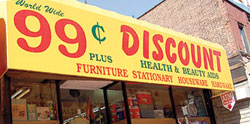
99-cent stores are proliferating all over the city because of the down economy. Bargain retailers are having a New York City moment. Emboldened by recession-friendly rents, local 99-cent stores are spreading their wings in the outer boroughs and eyeing Manhattan. Other discount stores — from Costco to outlet store Nordstrom Rack — are also in a New York City growth spurt.
“We came out of a retail climate where credit was king, and everyone traded up,” said Andrew Mandell, a broker with Ripco Real Estate. “Now rents have come down, and people have traded down in terms of what they are purchasing.”
Rick Stassa, executive vice president of Friedland Realty, sees 99-cent store activity all over the Bronx and Upper Manhattan. He brokered the lease for a 99 Cent Discount King store at 2364 University Avenue in the Bronx, which opened in January. “I just got off the phone with four 99-cent store people this morning, trying to put together deals with them,” Stassa said last month. “They are the ones expanding, and these guys do not pay top dollar for space.”
In the Bronx, the dollar stores are the “retailers that are the most active in the market,” filling the void left by the banks, drugstores and — save for MetroPCS — cell phone stores, Stassa said.
In general, the local dollar stores cannot pay rent over $40 a square foot in the Bronx. By contrast, the banks, drug chains and cell phone stores were shelling out three times that for a prime location at the height of the market in 2006 and 2007, Stassa said.
Due to their low-cost structure — inexpensive fixtures, few personnel — 99-cent stores have among the highest returns on investment of any retail format, said Howard Davidowitz, chairman and founder of Davidowitz & Associates, a national retail consultation and investment banking firm in New York. “The model is terrific,” he said.
And as a general proposition, discount stores, including 99-cent stores, shine in a downturn. “If you’ve got unemployment of 9.7 percent, record consumer bankruptcies, record food stamp [usage], a consumer that has lost trillions in available credit, with home values underwater… guess what: It’s dollar-store time,” Davidowitz said.
Whereas national chains require retail boxes of distinct sizes, the local dollar stores are more flexible. “These local guys can take various size ranges and be able to adapt,” Stassa said, adding that he’s done deals in spaces ranging from 1,800 to 20,000 square feet.
Friedland Realty is also negotiating a deal for 99 Cent Discount King on Southern Boulevard in the Bronx, which could open by summer. What’s more, another dollar-store merchant is considering two Bronx locations.
In most areas in Manhattan, owners would resist a 99-cent store, Mandell said.
But that’s now changing. The dollar stores are sizing up spots in secondary retail locations in Manhattan neighborhoods such as Washington Heights and Harlem, Stassa said.
The 99-cent stores are also expanding in Brooklyn.
Adir Cohen, director of leasing and acquisitions at Renaissance Realty Group LLC, brokered the lease for a 99 Cents City store at 293 Knickerbocker Avenue for “north of $35 a square foot,” he said. It was scheduled to open this month.
About two years ago at the same location, “we were trading numbers with an organic supermarket and pharmacy for close to $65 a square foot,” Cohen said. “Landlords are more flexible and realistic in today’s economy.”
Meanwhile, at 2211 Church Avenue, a more expensive retail corridor than Knickerbocker, an All Around 99 Cents store is scheduled to open in late spring or early summer. The rent was a little more than $60 a square foot, Cohen said.
But it’s not just the local mom-and-pop merchants that are fueling the format’s expansion in the city.
The national dollar chains have also set their sights on the market, Cohen said. Dollar General, Family Dollar and Dollar Tree are being “aggressive” in scoping out locations on Flatbush Avenue, Utica Avenue, Broadway and Knickerbocker Avenue in Brooklyn for potential stores, according to Cohen.
Just as the dollar stores expand in the outer boroughs, the national discount chains are also taking on Manhattan.
“Everything is very, very price driven right now, more than ever,” Stassa said.